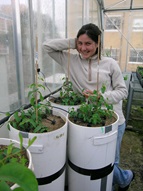Bachelor of Science (Hons) in Botany
 |
Thereis Choo
Coordinating Director / LC & FM & Centre Director / FDC
Doctor of Philosophy, Cornell University, 2017
Bachelor of Science (Hons Class I) in Botany, The University of Melbourne, 2006
|
I think when Sir David Attenborough and Captain Planet rank as two of the most memorable television figures from your childhood, it’s pretty clear that you are a person with a penchant for the environment and the natural world. In my case, I knew I wanted to pursue a degree in a field related to biology, and after 12 years of being classroom-bound in Singapore city, I was also eager for the opportunity to study overseas and explore another part of the world. Although it was this adventure-lust that first got me checking out the National Parks Board overseas scholarship, it was the later discovery of what NParks stood for that eventually won me over. Here was an agency dedicated to improving urban life, both at an environmental and social level, by transforming it into a tropical Eden – something that appealed to me very much. I must have been completely and utterly taken in by the notion of becoming an agent of greening, because before I knew it, I was waving goodbye to my family and friends on the other side of the glass panel at Changi Airport and rushing off to catch my plane bound for Melbourne, Australia.
The four years I spent at Melbourne University could only be described as ace.Botany was a fascinating and exciting field of study, and as the months went by, I found myself enjoying it more and more. Much to the envy of my three electrical engineering housemates, field based excursions were a regular part of botany subjects. Throughout the three-year course, my friends and I had opportunities to visit coastal, temperate rainforest as well as dry mallee environments. The most memorable of all the excursions was a two-week summer subject held in the alpine region of Victoria. Usually covered with snow, the summer window meant that all the wildflowers were in full bloom, making our mountain treks a riot of colour.
Don’t get me wrong, there was real work involved too. My final honours year was spent attached to the Plant Physiology Laboratory, working on a project that encompassed both field and lab based components. Overall, it was a fulfilling year, with most of us pulling through, equipped with some plant knowledge and hands-on experience under our belts. For the distinguished few, there was also the exciting prospect of getting your thesis results published in a scientific journal.
Studies aside, one of the best things about living in another country was having the chance to try things you wouldn’t necessarily be able to do back home. For me, I satisfied that thirst for adventure by being part of the ten-strong team that represented Melbourne University in the annual Sydney to Hobart offshore sailing race in 2004. The two years of training and racing allowed me a chance to see quite a lot of the Australian coastline, as well as many unforgettable sights out at sea. Not everyone was lucky enough to experience having 7 dolphins glowing in the bioluminescence as they swam beside the boat under the starry night, the sheer terror of 10m breaking waves approaching you in the middle of a gale or the sudden surprising stench of fish as a whale comes up for air nearby.
My job as a Parks Manager in East Coast Park was a multi-faceted one, combining the roles of site manager, landscape designer, public service provider and business manager. It’d been a challenging 6 months, both in re-assimilating into life back home, as well as learning the ropes of the job, but a thoroughly enjoyable 6 months as well. Even though my studies had armed me with a deeper understanding and appreciation of the plant world, the finer practical aspects of the job were definitely learnt through experience. I was gratified to have a group of highly knowledgeable colleagues to constantly look over my shoulders, ensuring that every plant or tree under my care would continue to flourish.
We strived to ensure that the park landscape was properly maintained and most important of all, that the experience of using our park was a positive one to all who visited by catering to their needs in terms of facilities and activities. One of the exciting things about working in a park was that you never know what challenge each day would bring. You could be having a site meeting with a business licensee one moment, or attending to some public feedback or an urgent fallen tree case in the next. But even when the day seemed to be bursting at the seams with things to do, you could always take a moment to appreciate your surroundings and just enjoy being outdoors.
What I like most about this job is how you can definitively effect change. Regardless of whether you’ve done something big or small - from planting a new tree sapling or constructing a new footpath to playing a role in the development of the next major attraction - the effects of your actions are immediately tangible to those around you.
No matter what new challenge each day brings, I can always go home with the knowledge that my work has in some way contributed to Singapore’s green image by making our parks a more pleasant place. If you think you can get satisfaction out of improving lives and places, then I’d encourage you to be part of our passionate team in making Singapore a unique City in the Garden.